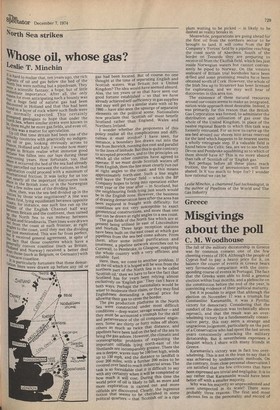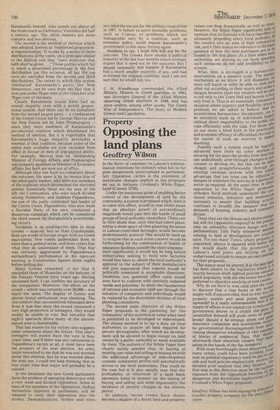Greece
Misgivings about the poll
C. M. Woodhouse
The fall of the military dictatorship in Greece was by common consent one of the few, cheering events of 1974. Although the people of Cypras had to pay a heavy price for it, on balance the course of events in Greece hears very favourable comparison with the corresponding course of events in Portugal. The fact that the Greeks were able to hold a ,general election within four months, and a plebiscite on the constitution before the end of the year, is convincing evidence of their political maturity.
Yet it is possible to argue that although the election on November 17 was a triumph for Constantine Karamanlis, it was a Pyrrhic victory for democracy. Considering that the conduct of the election was technically above reproach, and that the result was an overwhelming victory for a fundamentally conservative party, this may seem a strange and ungracious judgement, particularly on the part of a Conservative who had spent the last seven years consistently attacking the military dictatorship. But it nevertheless expresses a disquiet which 1 share with many friends in Greece.
Karamanlis's victory was in fact too overwhelming. This is not in the least to say that it was achieved by undemocratic methods. On the contrary, from close personal observation I am satisfied that the few criticisms that have been expressed are trivial and negligible. It is to say rather that Karamanlis would have been better off with a smaller majority.
Why was his majority so unprecedented and even unexpected in its scale? There were probably three reasons. The first and most obvious lies in the personality and record of Karamanlis himself, who stands out above all his rivals much as Eleftherios Venizelos did half a century ago. The other reasons are more complex and less obvious.
The second is the method of election which was adopted, known as 'reinforced proportional representation.' It works by a series of three distributions of the votes, on a principle similar to the Biblical rule that "unto everyone that hath shall be given...." Those parties which fail to reach a prescribed percentage in the first distribution (on this occasion, all but the top two) are excluded from the second and third distributions. The extent to which this system 'reinforced' Karamanlis's party, the New Democracy, can be seen from the fact that it won just under 55 per cent of the votes but over 70 per cent of the seats. , Clearly Karamanlis would have had an overall majority even with a purely proportional system. And there can be no complaint from the second largest party — a combination of the Centre Union led by George MavroS and the New Forces led by John Pesmazoglou — since they were members of Karamanlis's pre-electoral coalition which determined the method of election. But it is regrettable that Karamanlis's huge majority precludes a renewal of that coalition, because some of the ablest men available are now excluded from office in favour of men of less proved ability. For example, Mavros was an outstanding Minister of Foreign Affairs, and Pesmazoglou was uniquely qualified as Minister of Economic Affairs, but both are now out of office.
Although they can have no complaint about the outcome, the same is by no means true of the other party leaders, who were not members of the coalition which determined the electoral system. Essentially these are the men of the left: the Communists, who were much divided among themselves, and Andreas Papandreou, the son of the justly celebrated late leader of the Centre Union. Papandreou, who now leads a Socialist Party of his own, conducted a disastrous campaign which can be considered the third reason for Karamanlis's overwhelming victory.
Socialism is an unattractive , idea to most Greeks — scarcely less so than Communism. Both are words of foreign origin with no Greek equivalents. Few voters understand them in more than a general sense, and most voters fear what they do understand of them. That fear was certainly aggravated by Papandreou's extraordinary performance at his open-air meeting in Constitution Square three nights before polling day.
Many Greeks remarked o me that it ' reminded them of Mussolini on the balcony of the Palazzo Venezia forty years ago. Having witnessed both, I can confirm the accuracy of the comparison. Moreover, the effect on the crowd — which was certainly over 50,000 — was much the same. The display of frantic and almost brutal enthusiasm was alarming. The one comfort that uncommitted Athenians drew from it was that since the crowd contained a very high proportion of teenagers, they would mostly be unable to vote. But certainly that night's spectacle drove many of the uncommitted over to Karamanlis.
That last reason for his victory, also suggests some uneasiness about the future. This year's teenagers will mostly have the vote in four years' time; and if there was any calculation in Papandreou's tactics at all, it must have been the prospect of the next election. An army major remarked to me that he was not worried about this election, but he was worried about the next one. I could not help thinking that in four years' time that major will probably be a colonel.
In the meantime the new Greek parliament faces the problem of operating democracy with a very weak and divided Opposition. Some at least of the members of the Opposition, finding themselves impotent in parliament, will be tempted to carry their opposition into the streets. Demonstrations, strikes and riots
• provided the excuse for the military coup d 'etat in 1967. A failure to solve insoluble problems, such as Cyprus, or problems which are manageable only by a coalition, such as economic policy, could expose Karamanlis's government to the same threats again. Needless to say, 1 hope this will not be the outcome. The Greeks have shown a political maturity in the last four months which strongly argues that it need not be the outcome. But I should versonally feel happier if Karamanlis
• had a much smaller majority, if any, and had re-formed his original coalition. And I am not: sure that he would not, too.
C. M. Woodhouse commanded the Allied Military Mission to Greek guerillas in 1943, was Secretary General of the Allied Mission observing Greek elections in 1946, and has since written, among other works, The Greek War of Independence, The Story of Modern Greece and Capodistria.



































 Previous page
Previous page